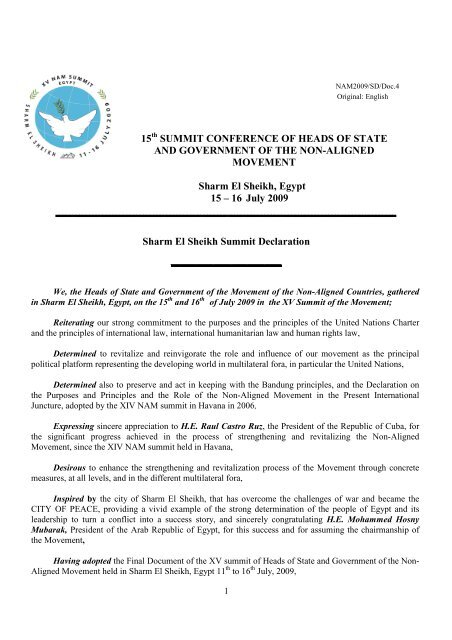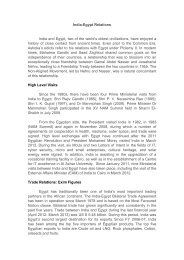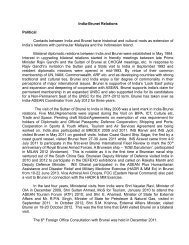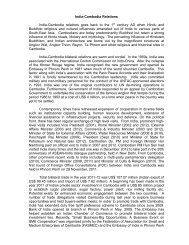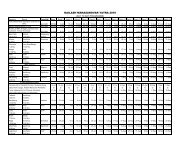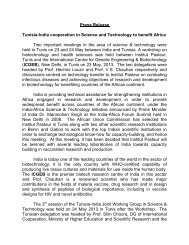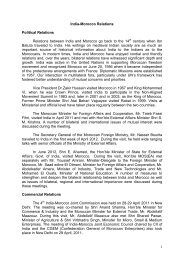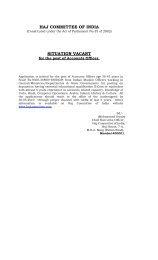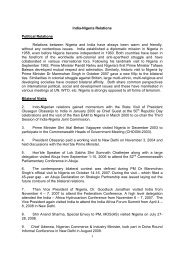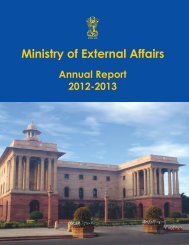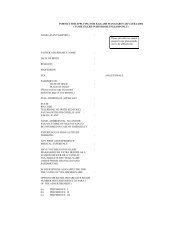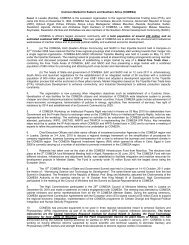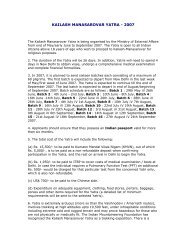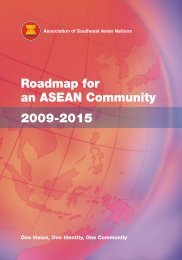Sharm El Sheikh Plan of Action 2009-2012
Sharm El Sheikh Plan of Action 2009-2012
Sharm El Sheikh Plan of Action 2009-2012
Create successful ePaper yourself
Turn your PDF publications into a flip-book with our unique Google optimized e-Paper software.
NAM<strong>2009</strong>/SD/Doc.4<br />
Original: English<br />
15 th SUMMIT CONFERENCE OF HEADS OF STATE<br />
AND GOVERNMENT OF THE NON-ALIGNED<br />
MOVEMENT<br />
<strong>Sharm</strong> <strong>El</strong> <strong>Sheikh</strong>, Egypt<br />
15 – 16 July <strong>2009</strong><br />
<br />
<strong>Sharm</strong> <strong>El</strong> <strong>Sheikh</strong> Summit Declaration<br />
_____________<br />
We, the Heads <strong>of</strong> State and Government <strong>of</strong> the Movement <strong>of</strong> the Non-Aligned Countries, gathered<br />
in <strong>Sharm</strong> <strong>El</strong> <strong>Sheikh</strong>, Egypt, on the 15 th and 16 th <strong>of</strong> July <strong>2009</strong> in the XV Summit <strong>of</strong> the Movement;<br />
Reiterating our strong commitment to the purposes and the principles <strong>of</strong> the United Nations Charter<br />
and the principles <strong>of</strong> international law, international humanitarian law and human rights law,<br />
Determined to revitalize and reinvigorate the role and influence <strong>of</strong> our movement as the principal<br />
political platform representing the developing world in multilateral fora, in particular the United Nations,<br />
Determined also to preserve and act in keeping with the Bandung principles, and the Declaration on<br />
the Purposes and Principles and the Role <strong>of</strong> the Non-Aligned Movement in the Present International<br />
Juncture, adopted by the XIV NAM summit in Havana in 2006,<br />
Expressing sincere appreciation to H.E. Raul Castro Ruz, the President <strong>of</strong> the Republic <strong>of</strong> Cuba, for<br />
the significant progress achieved in the process <strong>of</strong> strengthening and revitalizing the Non-Aligned<br />
Movement, since the XIV NAM summit held in Havana,<br />
Desirous to enhance the strengthening and revitalization process <strong>of</strong> the Movement through concrete<br />
measures, at all levels, and in the different multilateral fora,<br />
Inspired by the city <strong>of</strong> <strong>Sharm</strong> <strong>El</strong> <strong>Sheikh</strong>, that has overcome the challenges <strong>of</strong> war and became the<br />
CITY OF PEACE, providing a vivid example <strong>of</strong> the strong determination <strong>of</strong> the people <strong>of</strong> Egypt and its<br />
leadership to turn a conflict into a success story, and sincerely congratulating H.E. Mohammed Hosny<br />
Mubarak, President <strong>of</strong> the Arab Republic <strong>of</strong> Egypt, for this success and for assuming the chairmanship <strong>of</strong><br />
the Movement,<br />
Having adopted the Final Document <strong>of</strong> the XV summit <strong>of</strong> Heads <strong>of</strong> State and Government <strong>of</strong> the Non-<br />
Aligned Movement held in <strong>Sharm</strong> <strong>El</strong> <strong>Sheikh</strong>, Egypt 11 th to 16 th July, <strong>2009</strong>,<br />
1
Welcoming the Initiative by Egypt to convene the NAM First Ladies Summit on “the Role <strong>of</strong> Women<br />
in Crisis Management”, which laid the ground for a fruitful and valuable exchange <strong>of</strong> experiences and<br />
lessons learned, reflecting the importance attached by NAM to the active and equal participation <strong>of</strong> women<br />
in addressing the current global crises and challenges,<br />
Declare that within the implementation <strong>of</strong> the <strong>Sharm</strong> <strong>El</strong> <strong>Sheikh</strong> Final Document, and the documents <strong>of</strong><br />
the previous NAM Summits and Ministerial Meetings, due consideration should be given to maximizing the<br />
ability <strong>of</strong> NAM to deal with the current rapidly evolving global situations, crises and challenges, including<br />
but not limited to the following:<br />
Disarmament and International Security: Continue to promote disarmament and international<br />
security and stability on the basis <strong>of</strong> equal and undiminished security for all, bearing in mind that total and<br />
complete Nuclear Disarmament remains the only route to establish a world free from Nuclear Weapons,<br />
taking into consideration related issue <strong>of</strong> Nuclear Non Proliferation in all its aspects and the inalienable right<br />
<strong>of</strong> all states to the peaceful uses <strong>of</strong> nuclear energy. We will thus engage constructively with concrete actions<br />
towards the implementation <strong>of</strong> the unequivocal undertaking by the Nuclear Weapon States, as well as the<br />
recent statements made by leaders <strong>of</strong> some Nuclear Weapons States to eliminate their nuclear arsenals and<br />
work towards realizing a World Free <strong>of</strong> Nuclear Weapons, including through the establishment <strong>of</strong> Nuclear<br />
Weapon Free-Zones, particularly in the Middle East region;<br />
Peacekeeping and Peace-building: to ensure that the current comprehensive review <strong>of</strong> Peace Keeping<br />
Operations takes duly into account the position <strong>of</strong> the Movement, in particular the demands <strong>of</strong> Troop<br />
Contributing Countries, and to ensure that the review processes <strong>of</strong> the Peace Building Commission and the<br />
Peace Building Fund will achieve their objectives to support all countries emerging from conflict, based on<br />
the principle <strong>of</strong> national ownership and coordinated activities within the United Nations system;<br />
Human Rights and Democracy: Reinforce and build new momentum in addressing human rights<br />
issues based on a cooperative and balanced approach focused on constructive dialogue and capacity building,<br />
while taking duly into account the diversity <strong>of</strong> societies, political, economic, social and legal systems,<br />
cultures and religions, and avoiding selectivity, double standards and any attempt to exploit or use human<br />
rights as an instrument for political purposes, with a view to reinforcing the commitment to the promotion<br />
and protection <strong>of</strong> all human rights and fundamental freedoms for all, in particular the right to development,<br />
Self Determination: Continue to uphold the fundamental and inalienable right <strong>of</strong> all peoples,<br />
including all non-self governing territories, as well as those territories under foreign occupation and colonial<br />
or alien domination to self determination, the exercise <strong>of</strong> which, in the case <strong>of</strong> peoples under foreign<br />
occupation and colonial or alien domination, remains valid and essential to ensure the eradication <strong>of</strong> all these<br />
situations and to guarantee universal respect for human rights and fundamental freedoms;<br />
The Situation in the Middle East, the Core <strong>of</strong> Which is the Palestine Question: Demand achieving a<br />
just and comprehensive peace in the Middle East based on relevant United Nations Security Council<br />
Resolutions, Madrid Terms <strong>of</strong> Reference, land for peace, and the Arab Peace Initiative in its entirety;<br />
- Firmly support the inalienable rights <strong>of</strong> the Palestine people to self-determination and the<br />
establishment <strong>of</strong> their independent, contiguous and viable State in Palestine with East Jerusalem as its<br />
capital, and a just and agreed upon solution to the Palestine refugee question on the basis <strong>of</strong> resolution 194,<br />
through the termination <strong>of</strong> Israeli occupation that started in 1967 and a just and comprehensive approach<br />
encompassing all six core issues. In this regard, we will stand firm against all settlement activities illegally<br />
undertaken by Israel, the occupying power, in the Occupied Palestinian Territory, including East Jerusalem,<br />
2
and against Israeli measures and actions aimed at changing the legal status, character, and demographic<br />
composition <strong>of</strong> the City <strong>of</strong> Jerusalem.<br />
- Continue to demand Israel to comply with relevant Security Council Resolutions and withdraw fully<br />
from the occupied Syrian Golan to the line <strong>of</strong> 4 June 1967, and to withdraw fully from the remaining<br />
Lebanese occupied land in the Shabaa Farms, the Kafrashuba hills and the northern part <strong>of</strong> the Al Ghajjar<br />
village.<br />
Reform <strong>of</strong> the United Nations: To restore the balance between the Principal Organs <strong>of</strong> the United<br />
Nations and reaffirm the role and authority <strong>of</strong> the General Assembly, while asserting its fundamental role in<br />
international peace and security and in promoting multilateralism. The expeditious reform <strong>of</strong> the Security<br />
Council through its expansion and improvement <strong>of</strong> its working methods should continue to be a priority for<br />
NAM taking duly into consideration the views <strong>of</strong> all NAM Member States;<br />
Sanctions: Reject the unilateral sanctions imposed on some NAM countries, which adversely affect<br />
the economies and peoples <strong>of</strong> those countries, in contradiction with international law and the purposes and<br />
principles <strong>of</strong> the United Nations Charter.<br />
The World financial and economic crises, its causes and implications: In view <strong>of</strong> the fact that the<br />
Non Aligned and other developing countries are and will increasingly be the most adversely affected by the<br />
crises, more than industrialized countries, where it originated as a result <strong>of</strong> the structural imbalances and<br />
deficiencies <strong>of</strong> the prevailing International economic and financial systems, we commit to stand together, in<br />
coordination with the Group <strong>of</strong> 77 and China through the Joint Coordinating Committee, to achieve the<br />
fundamental reform <strong>of</strong> the international economic and financial systems and architecture so as to address its<br />
flaws. We commit further to enhance the voice and participation <strong>of</strong> developing countries in international<br />
economic and decision making and norm setting, including in international financial institutions, with a<br />
central role <strong>of</strong> the United Nations and its member states through the General Assembly and the Economic<br />
and Social Council, including in mitigating the impact <strong>of</strong> the crises on developing countries and in<br />
materializing the right <strong>of</strong> developing countries to a legitimate policy space. To achieve these objectives, we<br />
will utilize fully the follow up actions decided in the outcome <strong>of</strong> the United Nations High Level Conference<br />
on the World Financial and Economic Crises and its impact on development, and ensuring that measures<br />
taken to respond to the effects <strong>of</strong> the crises are in no case taken at the expense <strong>of</strong> developing countries as<br />
well as rendering full support for initiatives taken at the regional level to respond to the crises;<br />
The Internationally Agreed Development Goals, including the MDG’s: Ensure the full<br />
implementation <strong>of</strong> the outcomes <strong>of</strong> major United Nations conferences and summits in the economic and<br />
social fields, including the Monterrey Consensus, the Doha Declaration on Financing for Development and<br />
the Johannesburg <strong>Plan</strong> <strong>of</strong> Implementation as well as utilizing the high-level meeting organized by the United<br />
Nations Secretary General in 2010; and comprehensively evaluate the progress achieved in the<br />
implementation <strong>of</strong> the MDGs and to develop a strategy to help developing countries to achieve MDGs by<br />
2015, taking fully into account, inter alia, the United Nations Political Declaration on Africa’s Development<br />
Needs adopted during the 63rd session <strong>of</strong> the General Assembly, as well as the special needs and<br />
vulnerabilities <strong>of</strong> LDCs, LLDCs and SIDS in line with the related declarations <strong>of</strong> various United Nations<br />
conferences;<br />
Food Security: To ensure Food Security for all peoples <strong>of</strong> the States members <strong>of</strong> the Movement and<br />
other developing countries, we will enhance cooperation and coordination with the United Nations, FAO,<br />
IFAD, WFP and other multinational fora, in order to decisively deal with the short, medium and long term<br />
actions needed, including the need to address trade and agricultural related aspects within the current<br />
negotiations in the Doha round;<br />
3
Special Needs <strong>of</strong> Africa: Continue to promote the full implementation <strong>of</strong> all commitments by the<br />
international community to address the special needs <strong>of</strong> Africa as contained in the United Nations political<br />
Declaration on Africa’s Development Needs adopted during the 63 rd session <strong>of</strong> the United Nations General<br />
Assembly, especially in the area <strong>of</strong> conflict resolution, peace and security, development and poverty<br />
eradication, achievement <strong>of</strong> the Millennium Development Goals, strengthening <strong>of</strong> cooperation with regional<br />
organizations and programs including NEPAD, enhancing homegrown democracy, stability and rule <strong>of</strong> law,<br />
ensuring strict and fair adherence to international law and non abuse <strong>of</strong> the principle <strong>of</strong> universal jurisdiction.<br />
Pandemics: To enhance solidarity with and support to the governments and peoples <strong>of</strong> countries<br />
affected by the outbreak <strong>of</strong> H1N1 and other pandemics, to maximize the support given by the World Health<br />
Organization, international financial institutions and other relevant entities to assist developing countries in<br />
building their response capacity to confront pandemics as well as to combat diseases at times <strong>of</strong> crises and to<br />
provide full logistical and financial support for those governments and peoples;<br />
Civil Society: Encourage and enhance the role <strong>of</strong> Civil Society, including NGOs and the Private Sector<br />
in supporting the implementation <strong>of</strong> national development and human rights priorities and programmes,<br />
while adhering to the norms and principles <strong>of</strong> corporate responsibility;<br />
Climate Change: Strengthen the political momentum in preparation for the Copenhagen conference in<br />
a manner that duly reflects the views <strong>of</strong> NAM countries with regard to mitigation, adaptation, finance,<br />
technology transfer, capacity building and shared vision in accordance with the principle <strong>of</strong> Common but<br />
Differentiated Responsibilities, and fully utilize the high level meeting to be convened by the Secretary<br />
General <strong>of</strong> the United Nations at the beginning <strong>of</strong> the 64 th session <strong>of</strong> the General Assembly to highlight the<br />
concerns <strong>of</strong> the NAM countries;<br />
Energy: To shape a comprehensive United Nations energy agenda, including the creation <strong>of</strong> an<br />
effective mechanism to transfer advanced energy technologies to developing countries and countries with<br />
economies in transition, with the aim <strong>of</strong> achieving the Millennium Development Goals and dealing<br />
effectively with the challenge <strong>of</strong> climate change;<br />
Trafficking in Persons: Participate actively in the process launched by the President <strong>of</strong> the General<br />
Assembly and accelerate the consideration <strong>of</strong> a global action plan to be adopted by the General Assembly on<br />
combating trafficking in persons, through enhancing international and regional cooperation and partnership<br />
to supplement and support the implementation <strong>of</strong> the United Nations Convention on Transnational<br />
Organized Crime and the protocols thereto. In this respect, express appreciation to the leading efforts <strong>of</strong> the<br />
“Suzan Mubarak Women’s International Peace Movement” in gathering the support <strong>of</strong> the international civil<br />
society, NGOs and private sector through the “End Human Trafficking Now” initiative along with her efforts<br />
through the United Nations Global Initiative to Fight Human Trafficking (UNGIFT) and commit to support<br />
such efforts in the future;<br />
International Terrorism: Strengthen NAM solidarity in combating terrorism in all its forms and<br />
manifestations, wherever and by whomsoever committed, in accordance with the principles <strong>of</strong> the United<br />
Nations Charter, international law and the relevant international conventions. In this context, stress that<br />
terrorism should not be associated with any religion, nationality, civilization or ethnic group. Further<br />
progress is required, taking into account the positions and views <strong>of</strong> NAM member States, including through<br />
the early finalization <strong>of</strong> the draft Comprehensive Convention on International Terrorism, in strengthening the<br />
application <strong>of</strong> the United Nations Global Counter Terrorism Strategy and in convening a high level<br />
conference under the auspices <strong>of</strong> the United Nations, to formulate a joint organized response <strong>of</strong> the<br />
international community to terrorism in all its forms and manifestations, as proposed by President<br />
Mohammed Hosny Mubarak at the Council <strong>of</strong> Europe Parliamentary Assembly, in 1986;<br />
4
Enhancing dialogue among Civilizations and Religions: Utilize fully the efforts made at the<br />
international level towards reducing confrontation, enhancing dialogue, promoting respect for diversity<br />
based on justice, fraternity and equality, and oppose all attempts <strong>of</strong> uniculturalism or the imposition <strong>of</strong><br />
particular models <strong>of</strong> political, economic, legal or cultural systems, and promote dialogue among<br />
civilizations, culture <strong>of</strong> peace and inter-faith dialogue, which would contribute towards peace, security,<br />
stability and development.<br />
_______________________________________<br />
<strong>Sharm</strong> <strong>El</strong> <strong>Sheikh</strong>, 16 July, <strong>2009</strong><br />
5


